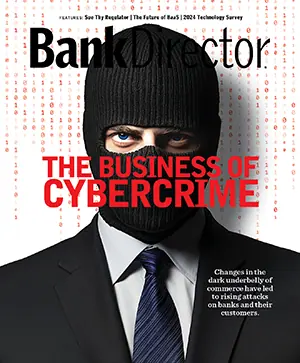
How Community Banks Can Compete With Buy Now, Pay Later
The offer is everywhere: Buy now, pay later.
One can now purchase glasses from Warby Parker, makeup and skincare from Sephora, workout clothes from Lululemon, even airfare from Southwest Airlines and pay for it in a convenient set of payments at a regular interval. Installment lending, meet online shopping – no bank needed. The rapid rollout and mass adoption of these types of installment loans risk edging out banks and their traditional role in issuing competitive and convenient credit products.
The appeal of buy now, pay later is similar to other installment loans: convenient, affordable and predictable financing. The current popularity of the approach can be partially attributed to widespread adoption among online retailers, which has made consumers more familiar with the offering, says Alex Johnson, director of fintech research at Cornerstone Advisors. Merchants see these installment loans as a way to improve their conversion rate by converting online shoppers into paying customers.
“That buy-in by merchants, I think, is the primary driver behind the explosion of buy now, pay later,” Johnson says. “Every merchant has integrated it.”
The loan is growing in familiarity and usage – which could force the traditional bank space to go on defense. Affirm Holdings, one of the most well-known players in the United States and provider of installment loans for Peloton Interactive, doubled the number of merchants on its platform and increased active consumers 60% year over year, according to its most recent earnings. It announced plans to launch a debit card, furthering its financial services and payments ambitions. And a number of surveys conducted by firms like C+R Research and The Ascent have found that a growing percentage of consumers are familiar with or have used buy now, pay later. The main fintechs offering financing include Affirm, Paypal Holdings, Afterpay Limited and Klarna Bank AB – which had an advertisement during the 2020 Super Bowl.
Online buy now, pay later loans are offered to customers at checkout. After undergoing an approval process, the payments debit at regular intervals from checking accounts. Some loans carry no interest or fees if payments are made on time. The fintechs make the bulk of their revenue by charging merchants a percentage of sales.
But banks have missed out on the space so far – and Johnson says that some of their responses also miss the mark. Some larger credit card issuers, including JPMorgan Chase & Co. and American Express Co., have implemented the ability to turn larger purchases made on a credit card into an installment loan within their online accounts. But Johnson predicts these alternatives won’t resonate with consumers, since they’re offered after a purchase rather than right before it. The way to compete in the space, he believes, is to join the fray and compete for merchant partnerships.
“The reason that customers are interested in buy now, pay later is because merchants are presenting it at checkout and are pushing consumers to use it,” he says. “If you’re a bank concerned about buy now, pay later, you can add whatever installment lending features to your card that you want. But if you don’t have merchant partners that are pushing the customer at that point of sale to use your option rather than someone else’s, you’re not going to solve your problem.”
Some banks are making those moves to deepen merchant partnerships and offer their own point-of-sale or installment loans. Apple once partnered with Providence, Rhode Island-based Citizens Financial Group to finance iPhone upgrades and MacBooks. Now, the technology company offers installment loans in partnership with The Goldman Sachs Group using Apple’s credit card. In June, the $187 billion Citizens announced it would become a POS installment lender for retailer BJ’s Wholesale Club. Birmingham, Alabama-based Regions Financial Corp. acquired EnerBank USA, which offers point-of-sale, home improvement loans through a network of contractors, for $960 million in cash. Those announcements followed Barclays US’s April announcement that the New York-based bank would partner with Amount, a retail banking fintech, to add buy now, pay later functionality to the suite of products and services it offers merchants, including many large travel companies. Amount is included in Bank Director’s FinXTech Connect platform, a curated database of proven financial technology solutions currently working with banks to better connect them with digital offerings.
“We see what the market wants and know a lot of younger people are using these types of products now,” says Doug Filak, Barclays’ head of retail POS financing. “Ultimately our customers – our partners – want to sell things. That’s what we’re trying to help them do.”
Amount’s merchant integration technology allows banks to leverage their deposits and underwriting and risk management expertise as a way to compete against the biggest players in the space, says Amount CEO Adam Hughes. Offering merchants a way to deepen relationships with returning buy now, pay later customers by incentivizing loyalty could be the edge banks need to compete, Johnson adds. Additionally, banks could white-label the products, a differentiator that may be appealing to some merchants. Some buy now, pay later providers use their mobile applications as a shopping portal to promote other merchants, which could annoy retailers who see competitors on the platform.
Banks without large e-commerce merchant clients haven’t completely missed out on the opportunity either, Johnson says. There are service providers like doctors’ offices, orthodontists and car repair shops where customers might prefer regular installment payments to avoid large cash payments or high interest on credit cards, and where a community bank may already have a relationship.
“All the big national merchants and big e-commerce merchants are getting gobbled up, but that doesn’t mean there’s not a lot of small businesses that wouldn’t benefit from this model,” Johnson says.



